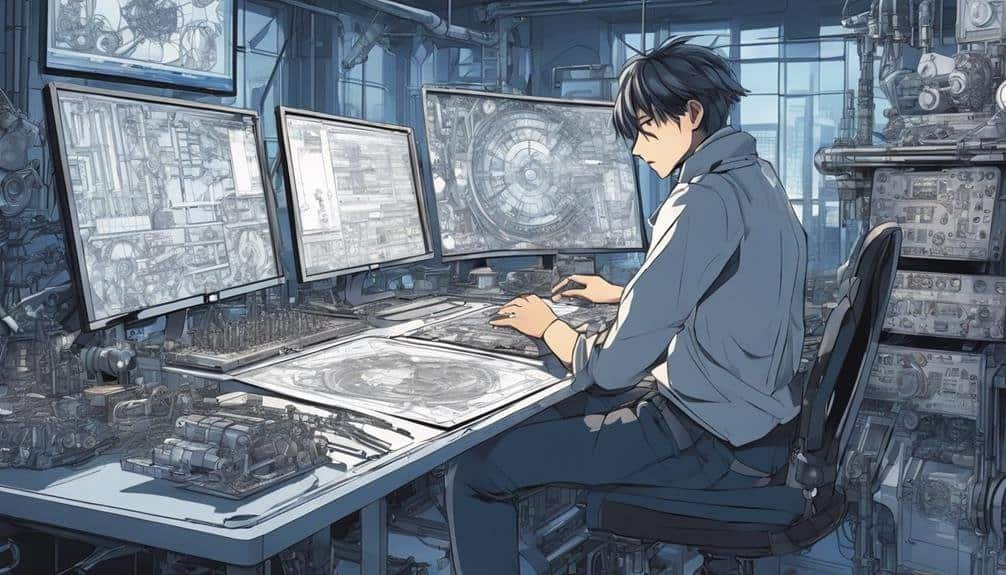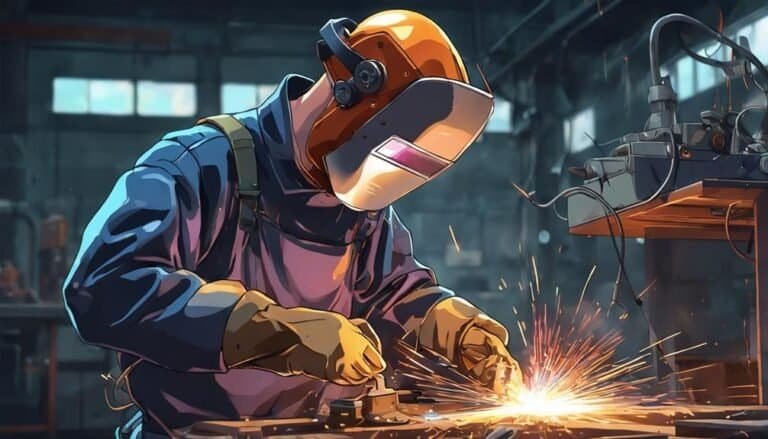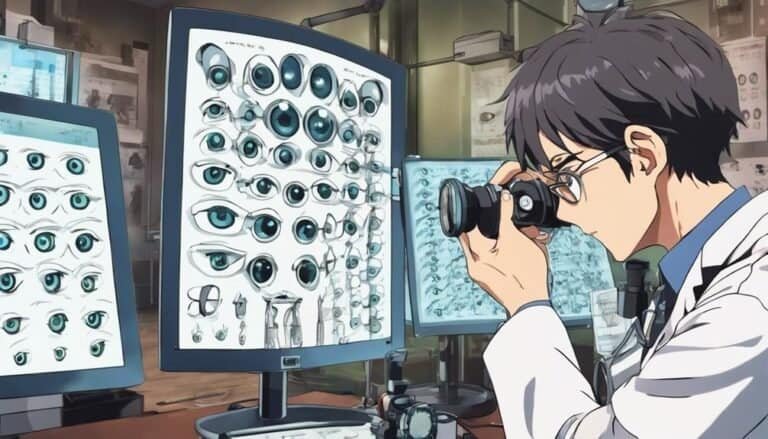Job Duties for Mechanical Engineer
In the domain of engineering, the role of a mechanical engineer is multifaceted and demanding. From the intricate task of designing machinery to the meticulous process of conducting tests and experiments, their responsibilities span a wide spectrum.
Additionally, the analytical work of evaluating mechanical systems and the creative aspect of developing prototypes keep them engaged in problem-solving. Collaborating with diverse teams on complex projects adds a dynamic element to their daily routine.
The blend of technical expertise and teamwork required in this profession makes it both challenging and rewarding.
Key Takeaways
- Develop innovative designs and ensure machine optimization for efficient performance.
- Conduct rigorous testing to analyze system performance and validate theoretical concepts.
- Collaborate effectively with teams, communicate ideas clearly, and optimize project efficiency.
- Adhere to industry regulations and standards while identifying areas for improvement and enhancing functionality.
Designing Machinery and Equipment
Designing Machinery and Equipment involves creating detailed technical drawings and specifications for the production of various mechanical systems and components. Mechanical engineers face a myriad of challenges in this process, including meeting industry standards, ensuring machine optimization, and developing innovative designs. Adhering to industry regulations and standards is essential to guarantee the safety and reliability of the machinery being designed. This necessitates a deep understanding of mechanical engineering principles and best practices to overcome the complexities involved.
Additionally, machine optimization is a key aspect of designing machinery and equipment. Engineers focus on enhancing the performance, efficiency, and reliability of the machines they design. This involves conducting thorough analyses, simulations, and evaluations to fine-tune the systems for best functionality. Innovation plays a significant role in this phase as engineers aim to develop cutting-edge designs that push the boundaries of what is currently possible in the field of mechanical engineering. Overcoming the challenges and intricacies of designing machinery and equipment requires a meticulous approach and a strong grasp of engineering fundamentals.
Conducting Tests and Experiments
Regularly conducting tests and experiments is an important component of a mechanical engineer's job duties, ensuring the verification and validation of design concepts and functionalities. Mechanical engineers follow stringent lab procedures to maintain accuracy and reproducibility in their experiments. Testing methods employed vary from non-destructive testing like ultrasound and x-rays to destructive testing such as mechanical loading tests. These experiments generate valuable data for analysis, aiding in the interpretation of research findings and the optimization of mechanical systems.
| Lab Procedures | Data Analysis |
|---|---|
| Follow strict protocols | Interpret research findings |
| Maintain accuracy | Optimize mechanical systems |
| Ensure reproducibility | Generate valuable insights |
| Implement safety measures | Identify design flaws |
Through meticulous testing and precise data analysis, mechanical engineers can refine their designs, troubleshoot issues, and enhance the efficiency and functionality of mechanical systems. The research findings obtained from these tests are important for making informed decisions and driving innovation in the field of mechanical engineering.
Analyzing Mechanical Systems
An integral aspect of a mechanical engineer's responsibilities involves meticulously analyzing the intricacies of mechanical systems to optimize performance and functionality. This analysis is critical for ensuring that the systems operate efficiently and effectively.
Here are three key aspects of analyzing mechanical systems:
- System Performance: Mechanical engineers are tasked with evaluating the performance of mechanical systems to determine if they are meeting the desired specifications and standards. This involves conducting tests, collecting data, and interpreting results to identify areas for improvement.
- Failure Analysis: Understanding why mechanical systems fail is essential for preventing future issues and enhancing reliability. Mechanical engineers utilize various techniques such as stress analysis, fatigue testing, and root cause analysis to identify the factors leading to system failures.
- Optimization Strategies: Once weaknesses or areas of improvement are identified through analysis, mechanical engineers develop optimization strategies to enhance system performance. This may involve redesigning components, adjusting operating parameters, or implementing new technologies to maximize efficiency and functionality.
Developing Prototypes and Models
In the process of meticulously analyzing mechanical systems, another critical aspect of a mechanical engineer's role involves developing prototypes and models to test and validate theoretical concepts. This phase requires a combination of creativity, technical skill, and precision to bring ideas to life in a tangible form. Mechanical engineers utilize various prototyping techniques and 3D modeling to create initial versions of their designs before moving to full-scale production.
| Prototyping Techniques | Material Selection |
|---|---|
| Rapid Prototyping | Strength and Durability |
| CNC Machining | Thermal Conductivity |
| 3D Printing | Cost-effectiveness |
Material selection is an important consideration during the prototyping stage, as engineers must choose materials that align with the desired performance characteristics of the final product. Once prototypes are developed, engineers conduct performance testing to evaluate factors such as structural integrity, functionality, and efficiency. This iterative process of prototyping and testing allows mechanical engineers to refine their designs and make sure they meet the required specifications before implementation.
Collaborating With Teams on Projects
Engaging in collaborative efforts with interdisciplinary teams is a fundamental aspect of a mechanical engineer's role when undertaking projects. Effective team communication and project coordination are essential for successful outcomes in engineering endeavors. Here are three key elements that highlight the significance of collaborating with teams on projects:
- Clear Communication:
Mechanical engineers must communicate their ideas, progress, and challenges clearly with team members from various disciplines to make sure everyone is on the same page. This includes actively listening to others' input and providing constructive feedback to foster a cohesive working environment.
- Task Delegation:
Project coordination involves assigning tasks based on individual strengths and expertise within the team. Mechanical engineers need to delegate responsibilities effectively, considering each team member's workload and capabilities to optimize project efficiency.
- Regular Meetings:
Scheduling regular team meetings to discuss progress, address issues, and realign project goals is essential. These meetings facilitate collaboration, enable problem-solving, and make sure that the project stays on track towards successful completion.
Conclusion
To sum up, the job duties for mechanical engineers involve designing machinery, conducting tests, analyzing systems, developing prototypes, and collaborating with teams.
Just as a well-oiled machine requires each component to work together seamlessly, a successful mechanical engineer must possess a diverse skill set and collaborate effectively with others to achieve best results.
By focusing on precision, innovation, and teamwork, mechanical engineers play a critical role in advancing technology and shaping the future.







